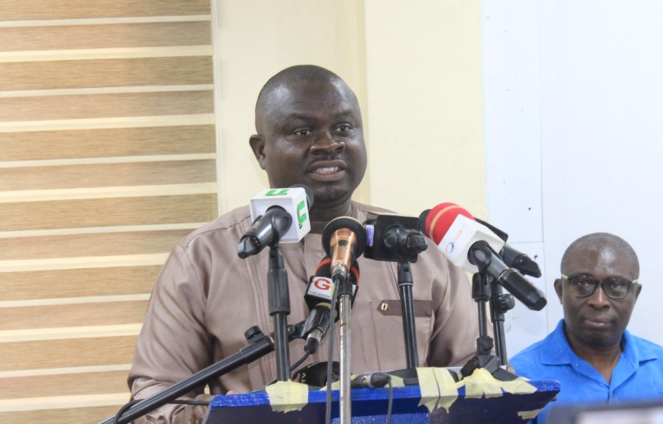Journalists have been urged to maintain their professional ethics as they promote issues involving human rights, peace, and democracy in the country.
Mr. Albert Kwabena Dwumfour, President of the Ghana Journalists Association (GJA), noted that while Ghana's Constitution guaranteed media freedom, journalists should not carry out their duty in a way that threatens the country.
“Freedom of the media does not mean discharge your duties in a manner that poses threat to the country. Let us all work together to promote human rights, peace, and democracy in the country.”
Mr. Dwumfour, speaking at the opening of a two-day training for selected journalists in Accra, said the country depended on them to maintain peace and democracy before, during, and after the December polls.
The training program aimed to increase media actors' capacity to report on human rights issues, prevent hate speech and violence, as the country prepares to vote in December.
The training was organised by the Commission for Human Rights and Administrative Justice (CHRAJ) and the Office of the High Commissioner for Human Rights (OHCHR) West Africa Regional Office, UNFPA, UNWOMEN and UNESCO.
Mr. Dwumfour said the media were protectors of truth, watchdogs of democracy, and voices for the voiceless.
He said that journalists should carry out their duties objectively, and that failing to do so would be a breach of their responsibility.
According to the GJA President, the issue of human rights concerned everyone, and if any group had suffered abuses in the recent past, it was the media.
“Attacks on journalists and other forms of abuse of journalists are issues the GJA takes seriously… so I expect you all to take the tutorials and presentations seriously and leverage on it to be better in that field,” he said
Madam Fatimatu Abubakari, Minister of Information, remarked in a speech read on her behalf that her ministry recognizes the crucial role journalists play in holding governments accountable and pushing for human rights.
“Your work is essential in shaping public discourse, exposing injustices and amplifying marginalized voices.”
Madam Abubakari described the training as timely because journalists would be navigating complex challenges in Ghana’s democracy.
“It is crucial for journalists to have knowledge and skills to effectively report on human rights issues, uphold ethical standards, and maintain the trust of the public,” she said.
The Minister said that the government had demonstrated its commitment to a free, independent, and responsible press by facilitating the establishment of the Africa Office of the Independent Funds for Public Interest Media in Accra, as well as enacting the Right to Information (RTI) Act of 2019 and the Whistleblowers Act.
“We believe that a vibrant media landscape is essential to our democracy,” she added.
Madam Abubakari urged journalists to continue holding politicians accountable by advocating for the truth and justice, adding that "this mandate must be carried out in the spirit of fairness, equity, and honesty."
Dr. Joseph Whittal, Commissioner of the CHRAJ, said that severe human rights concerns exist in Ghana and that collective action must be taken.
He said that, in terms of protecting the rights of vulnerable groups, journalists had unfortunately contributed to fuelling public resentment toward migrants and sexual minorities.
Dr. Whittal expressed concern with skewed reporting of "Fulanis" as accountable for every highway robbery.
He said that at the height of the recent LGBT discussion in the country, some people identifying as "Journalists Against LGBT" tried to encourage the prosecution of gay and lesbian individuals in the country.
“That approach in the considered view of CHRAJ was problematic as it was not informed by a proper understanding of human rights,” he said.
Dr Whittal said the workshop sought to deepen participants' understanding of human rights norms and the SDGs.
It was also intended to broaden journalists' knowledge base by investigating how human rights principles intersect with journalism, ethical considerations in reporting, and dealing with challenges faced by the media working in an environment where human rights and fundamental freedoms were constantly under threat.
Mr. Robert Kotchani, a Representative of the OHCHR West Africa Regional Office, noted that hate speech remained a source of concern in Ghana and urged for an end to divisive utterances and incitement to hatred or violence.
Latest Stories
-
Ghana and Seychelles strengthen bilateral ties with focus on key sectors
20 mins -
National Elections Security Taskforce meets political party heads ahead of December elections
23 mins -
Samsung’s AI-powered innovations honored by Consumer Technology Association
43 mins -
Fugitive Zambian MP arrested in Zimbabwe – minister
1 hour -
Town council in Canada at standstill over refusal to take King’s oath
1 hour -
Trump picks Pam Bondi as attorney general after Matt Gaetz withdraws
1 hour -
Providing quality seeds to farmers is first step towards achieving food security in Ghana
2 hours -
Thousands of PayPal customers report brief outage
2 hours -
Gary Gensler to leave role as SEC chairman
2 hours -
Contraceptive pills recalled in South Africa after mix-up
2 hours -
Patient sues Algerian author over claims he used her in novel
2 hours -
Kenya’s president cancels major deals with Adani Group
2 hours -
COP29: Africa urged to invest in youth to lead fight against climate change
3 hours -
How Kenya’s evangelical president has fallen out with churches
3 hours -
‘Restoring forests or ravaging Ghana’s green heritage?’ – Coalition questions Akufo-Addo’s COP 29 claims
3 hours

